15, December 2021
UK: Nearly 100 Conservative MPs revolt against Boris Johnson over new Covid-19 restrictions 0
Almost 100 Conservative lawmakers voted on Tuesday against new coronavirus restrictions, dealing a major blow to British Prime Minister Boris Johnson’s authority and raising questions about his leadership.
After a day of frenzied failed lobbying, Johnson was handed the biggest rebellion against his government so far by his party over measures he said were necessary to curb the spread of the new Omicron variant.
The new rules, which included ordering people to wear masks in public places and use COVID-19 passes for some venues, passed thanks largely to the main opposition Labour Party.
But the revolt piles pressure on Johnson, already under fire over scandals such as reported parties in his Downing Street office last year – when Britain was in a COVID-19 lockdown – and a pricey refurbishment of his apartment.
Rebelling lawmakers said the vote was a warning shot that he needed to change how the government was operating, or he would face a leadership challenge.
Some 99 Conservatives opposed plans for the COVID passes, a much higher number of rebels than was expected. Originally the official figure was put at 98, but the number was later revised upward.
Among those voting against the government was lawmaker Louie French who was only elected as a Conservative Member of Parliament (MP) at the start of the month, while media reported that former Prime Minister Theresa May was among 17 others who abstained.
Many Conservatives say some of the new measures are draconian, with several questioning the introduction of a certificate of vaccination or proof of a negative COVID-19 test to enter some venues, such as nightclubs.
Others used the votes as an opportunity to vent their anger at Johnson, believing the man who helped the Conservatives win a large majority at a 2019 election is squandering the party’s successes by self-inflicted missteps and gaffes.
But despite the rumblings of discontent, Conservative Party insiders say there is not enough of a groundswell against Johnson to dislodge him now, although they hope the vote will be a “wake-up call” for the prime minister to reset his agenda.
“He’s got to now be in some danger,” Conservative lawmaker Geoffrey Clifton-Brown told Sky News. “And he’s got to realise that because if he doesn’t realise that, then he will be in much bigger danger … I’m still backing him. But he’s got to change.”
‘Huge spike’
Britain reported 59,610 new COVID-19 infections on Tuesday, the highest figure since early January and the fifth highest recorded since the outbreak of the pandemic in March last year.
More than 5,300 cases of Omicron have been recorded, with 10 people hospitalised. One person has died after contracting the variant, which is set to become the dominant strain in the capital London.
Before the vote, the government had mounted a campaign to keep lawmakers in check, with Johnson warning his ministers there was a “huge spike” in Omicron cases heading Britain’s way, and that the measures were needed to protect people.
Ministers tried to win over the Conservative rebels, noting that people who have not had two vaccinations can instead offer proof of a negative lateral flow test to gain access to indoor venues of more than 500 people.
Health minister Sajid Javid told lawmakers he firmly believed in “individual liberty” but that “the responsible decision to take is…to move to plan B in England”.
But their arguments fell on deaf ears. In addition to the 99 Conservatives who voted against the passes, 40 voted against expanding the requirement for mask wearing.
“I am sure that the prime minister will understand the strength of feeling within the party about the constraint of liberties,” Conservative former minister David Jones told Reuters. “He is a libertarian himself and I have no doubt that he will listen to the message from his party.”
Source: REUTERS
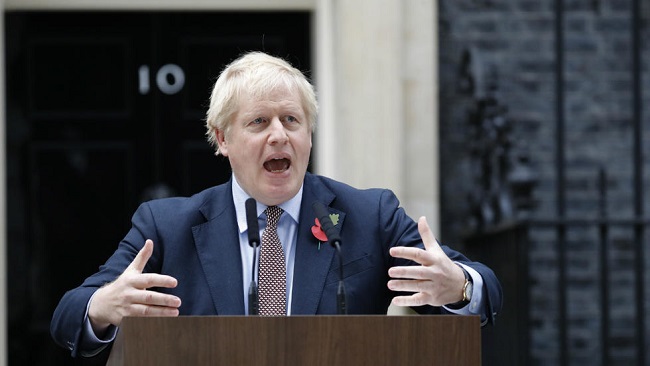
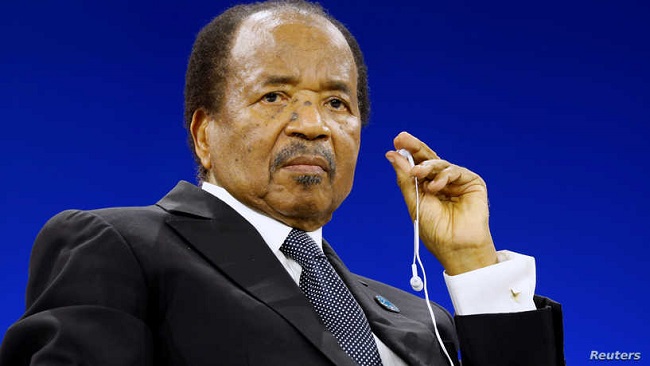
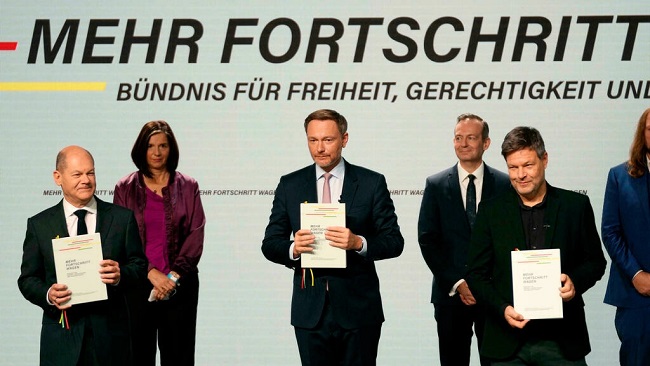

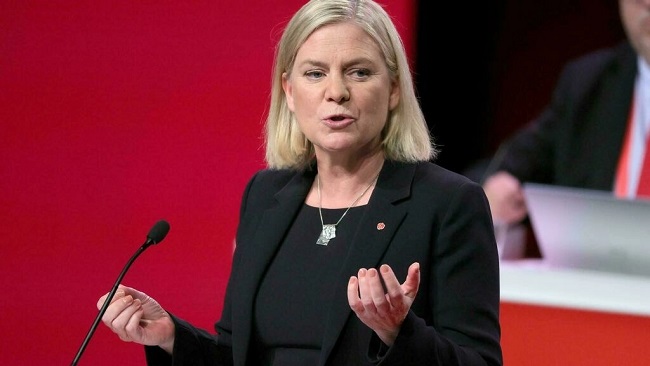

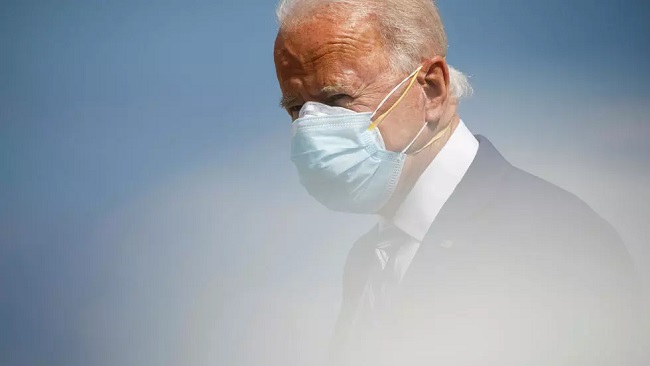
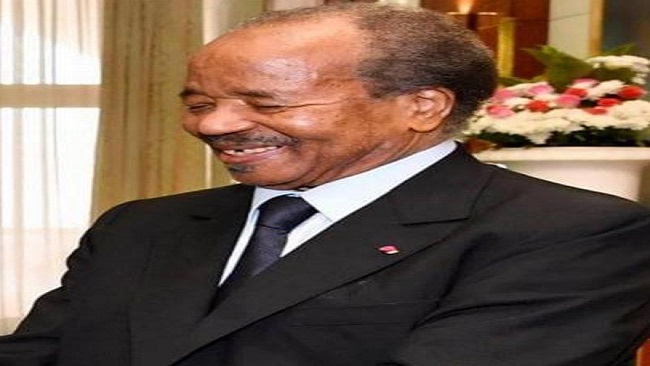


















16, December 2021
Corrupt France: Macron defends his record without formally declaring run for presidency 0
French President Emmanuel Macron declared his future “ambitions” for the country but declined to formally declare he was running for a second term in a lengthy prime-time TV interview on Wednesday that saw him defend his record as an economic reformer.
After a rare two-hour press conference last week to outline his European ambitions, the 43-year-old head of state sat down with journalists from the TF1 channel as campaigning ahead of next April’s vote hots up.
“If your question is ‘are you looking ahead?’,’do you have ambitions for our country, for French people beyond next April?’. Clearly,” the centrist replied when asked if he would be running for another five-year term.
“I never thought that we could do everything in five years,” he said during the interview which was pre-recorded but broadcast on Wednesday evening.
But he argued he needed to stay focused on governing before giving a “firm and sincere response” about his candidacy to the country.
As well as his recent media work, the country’s youngest-ever president when elected in 2017 has also been touring small-town and rural France in recent weeks in what has resembled grassroots campaigning.
Like his predecessors including Francois Mitterrand and Nicolas Sarkozy, observers say he appears intent on playing for time, using the presidential megaphone and the benefits of his office until as late as possible.
“I’ll keep going until the final quarter of an hour,” he said.
France’s role holding the rotating presidency of the European Union from January 1, which will see Macron set the official EU agenda, is also seen as another factor favouring a late declaration.
Level field?
Recent gains in the polls from some of his opponents next year might also explain his sudden willingness to open up to the media after years of keeping journalists at arm’s length.
On Friday, RTL radio is set to broadcast a special event in which he answers questions from school children.
Last week, a poll by the Elabe survey group showed the former investment banker losing the second round of the election on April 24 for the first time to right-winger Valerie Pecresse from the Republicans party.
Pecresse, the combative head of the greater Paris region and a former minister under Sarkozy, has enjoyed a huge bounce in the polls since clinching her party’s nomination on December 4.
She led criticism about Wednesday night’s TV interview which she said was evidence of an uneven playing field for those eyeing the Elysee Palace.
“We can’t have a president-candidate who has television channels open up for him whenever he wants it and is campaigning for hours on end, while his opponents get five minutes on a panel to respond to him,” she said on Monday.
She has promised to complain to France’s media regulator, the CSA, which monitors the time given to presidential candidates to ensure each of them gets a fair billing.
Regrets
Macron was asked repeatedly about mistakes early in his campaign when he was accused of talking down to voters, one of the factors behind a huge backlash from anti-government protesters known as “yellow vests”.
“I’ve learned to have a lot more respect for everyone, I think I can say,” Macron said, admitting that his “desire to shake things up” had sometimes been counter-productive.
“With some of my words I hurt people,” he said.
Socialist party politician Boris Vallaud decried the interview as a “like a public confession without a single new idea.”
Macron defended his reforms to labour laws, making it easier for companies to fire workers, as well as tax cuts which he said had made the country able to confront the Covid-19 crisis in a stronger position.
Unemployment in France fell to 8.1 percent in the last quarter, down from 9.5 percent when Macron was elected, but remains above the average of the other countries that use the euro.
He also implied that major pension reform, which he abandoned when the Covid-19 pandemic began, would be part of his programme for a second term.
He admitted that his initial ideas were too “anxiety-inducing” and needed to be reformulated, but the objective would remain the same.
“We need to be prepared for the idea of having to work for longer,” he said.
Source: AFP